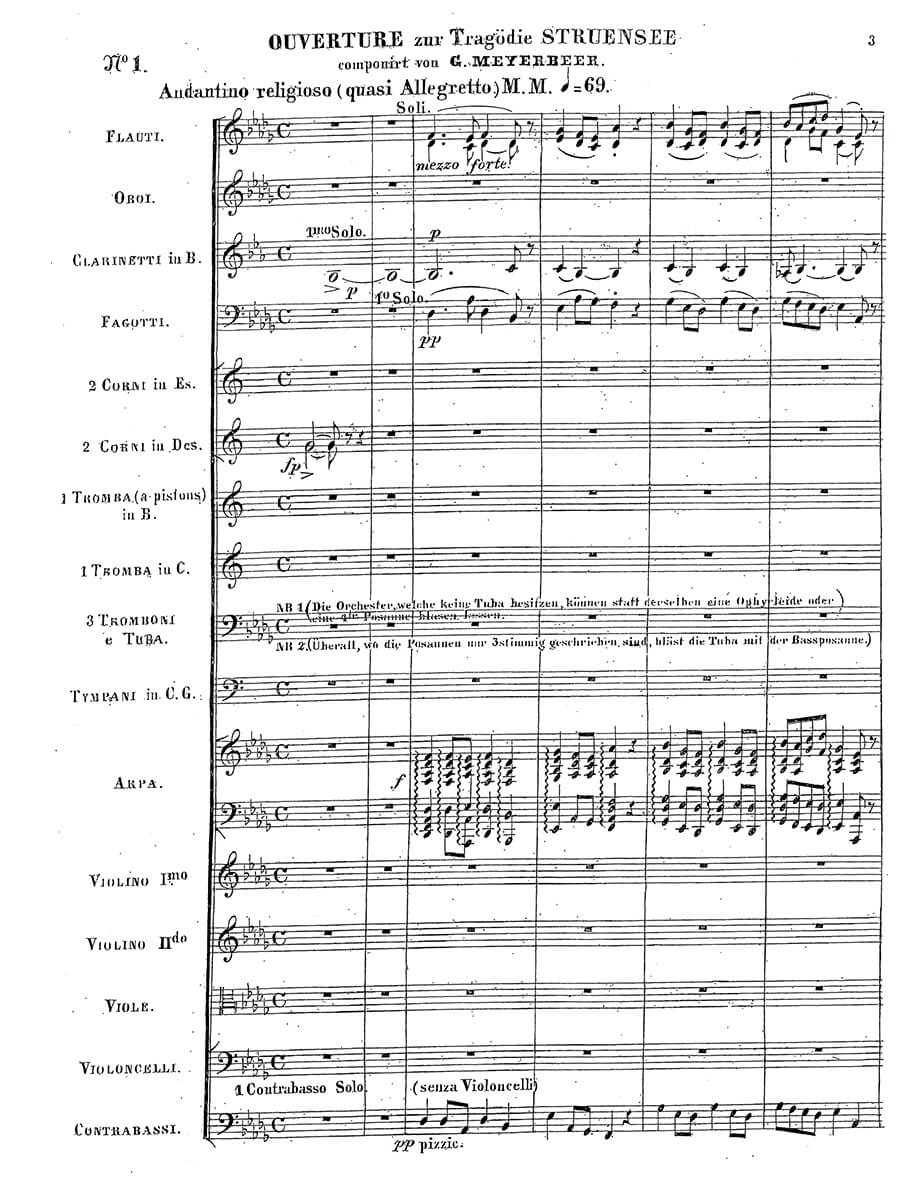Struensee, incidental music
Meyerbeer, Giacomo
45,00 €
Giacomo Meyerbeer – Struensee
(b. Berlin, 5 September 1791 – d. Paris, 2 May 1864)
Struensee
Trauerspiel in fünf Aufzügen mit Musik [tragedy in five acts with music]
Text: Michael Beer
First performance: Schauspielhaus, Berlin, 19 September 1846
Preface
Michael Beer’s idealistic tragedy Struensee concerns the German-born physician Johann Friedrich Struensee (1731-72) who gained ascendancy over the degenerate Danish king Christian VII and implemented an enlightened despotism, carrying out sweeping reforms in the realm of the legal system, serfdom, censorship, and the administration of Norway. His hasty methods, personal arrogance and illicit relations with the young Queen Caroline Matilda (1751-75) led to a conspiracy by the nobles and his mortal downfall.
The play was first performed on 27 March 1828, at the Königliche Theater, Munich, rather than in Beer’s home city of Berlin where it was banned for nineteen years. The sanction had been imposed in 1827 in spite of the attempts of Count Brühl, the director of the Royal Theatres. Because the play took place in the Danish Court, involving social and political intrigue of the highest order, the seizure of power by the Royal physician, his love affair with the queen, the execution of the former and the banishment of the latter, the material was regarded as too explosive for comfort. It was further feared that offence would be taken by the Danish Royal family who were in any case related to the Prussian dynasty. Twenty years later, in 1846, the ban on the performance of Struensee was lifted. With a changing political circumstance, and under the friendly disposition of Friedrich Wilhelm IV, Amalie Beer secured permission from the king for a production of her youngest son’s tragedy, with incidental music especially composed by her eldest.
Plot
Various locations in and around Copenhagen, 1772
Act 1
Struensee, the son of a German pastor, has become the physician to the King of Denmark, Christian VII. Because of great skills and political acumen, he has been raised to the position of prime minister. He is planning the regeneration of the Danish people by reducing the power of the proud and tyrannical nobility. One of his major acts in this respect is the licencing of the Norwegian Guard, where all the officers are nobles. This licencing comes into effect at the commencement of the drama, in 1772, at the royal castle of Christiansborg. Count Rantzau, Struensee’s predecessor as prime minister, tries to turn Struensee away from his reform projects, reproaching him, as a stranger, for his attachment to the queen, Mathilda of England, another stranger, in order to profit from the weakness of the king, and for upsetting the status quo in the kingdom. They part without reaching agreement, and Struensee, left alone, trembles in recalling that his face must have betrayed his emotion on hearing the queen’s name mentioned, since he secretly loves her (No.2 Melodrama). His father, the Pastor Struensee, enters at that moment, and vainly begs his son to renounce his dangerous power, and return with him to his retreat. …
Read full preface / Das ganze Vorwort lesen> HERE
| Score No. | |
|---|---|
| Edition | |
| Genre | |
| Size | |
| Printing | |
| Pages |
